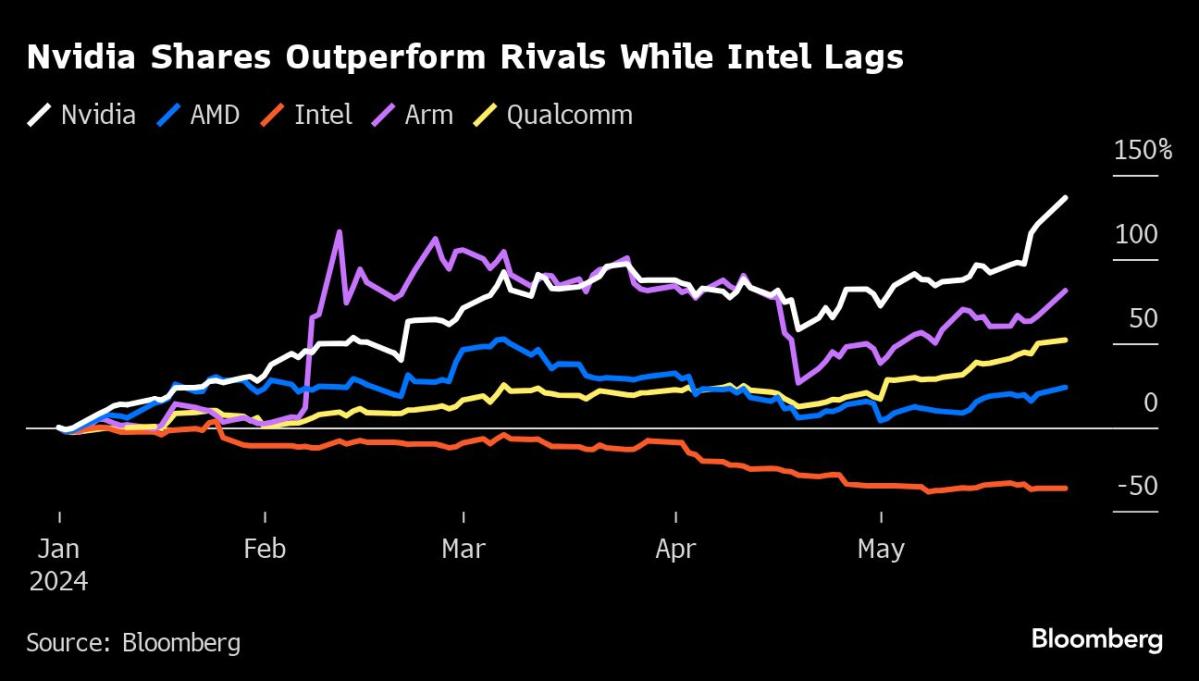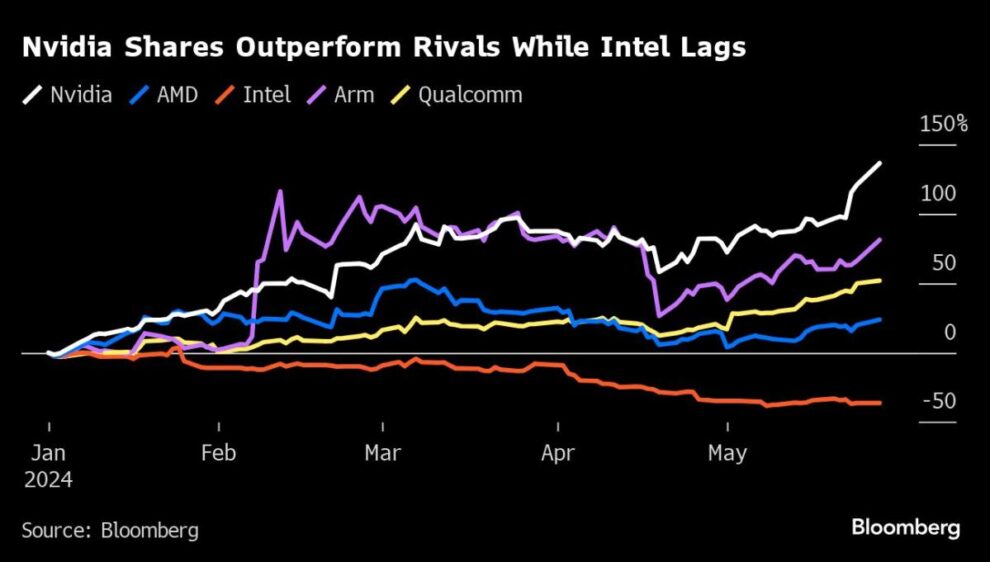
(Bloomberg) — Nvidia Corp.’s Jensen Huang will lead a gathering of tech business leaders in Taipei starting Sunday, an unusual opportunity for the industry’s most important executives to come together and figure out the future of computing and AI.
Most Read from Bloomberg
From Lisa Su of Advanced Micro Devices Inc. to Qualcomm Inc.’s Cristiano Amon, the biggest names in PC and chipmaking are joining Huang at Computex 2024 to exhibit the progress they’ve made in laying the foundation for technologies from ChatGPT-like AI to future smart devices. Those CEOs will make the case for their own products but also huddle in a search for answers to the most pressing issues facing the global tech sector, from geopolitical ructions and conflict to constrained supply of essential components such as high-bandwidth memory.
Uppermost on their minds is how to harness AI and ready their businesses for the coming change. Qualcomm’s betting on a partnership with Microsoft Corp. around new AI PCs that’ll bring its pedigree of smartphone processors to laptops. Pat Gelsinger of Intel Corp. and Arm Holdings Plc Chief Executive Officer Rene Haas will present their contrasting visions for the future of computing, while Tainan-born Huang will be asked how Nvidia plans to respond to Qualcomm’s new venture.
“This is a massive inflection, it is the biggest moment in the PC business in decades,” said Dan Newman, CEO and chief analyst at the Futurum Group. “AI is the hottest trend with the longest trail, it’s the earliest innings, and they’re all fighting.”
Taipei is a fitting location for hashing out those important questions. Its importance in the chip supply chain has never been greater, led by Taiwan Semiconductor Manufacturing Co. fabricating Apple Inc.’s iPhone chips, Nvidia’s must-have AI accelerators, AMD’s competing products and a good chunk of the Arm chips powering the global mobile market. The path to AI breakthroughs is paved with semiconductors and servers, many of which are made or assembled in Taiwan.
It’s also home to a coterie of lesser-known players that provide the building blocks for Nvidia’s products. The US company secured a seemingly unassailable lead in AI data centers, with the help of relationships Huang has cultivated with Taiwan’s server makers like Quanta Computer Inc. and, increasingly, Hon Hai Precision Technology Co. His last visit to the island was a marketing tour de force, as he lauded those firms and touted the trillion-dollar opportunity in AI.
AI servers will become a NT$1 trillion ($31 billion) revenue product at Hon Hai as soon as next year, its Chairman Young Liu said at the company’s annual shareholder meeting on Friday.
“Last year was already hot because of AI. And this year is explosive because AI is accelerating,” said James C. F. Huang, chairman of the Taiwan External Trade Development Council (TAITRA), which runs Computex. “We are like a big magnet.”
Read more: Taiwan Stands Out as Asia’s AI Canary
At a media event during last year’s Computex, Nvidia’s Huang presented an array of AI hardware from the company — from H100 AI chips to integrated server rack modules and proprietary technologies to help multiple components work like one unified computer. When asked if all those parts were made in Taiwan, Huang said that they were. Taiwan’s dominance has much to do with the fact that neither Intel nor Samsung Electronics Co. have matched TSMC’s technology leadership and manufacturing reliability.
That preeminence in the chipmaking and computing spheres is also a source of growing concern for governments, which are wary of the threat of China, which claims the island as part of its territory, taking it over by force. US firms have been asking Taiwanese partners to diversify the geography of their operations, to guard against a potential invasion from the mainland.
TAITRA’s Huang said that from chips to motherboards to server assemblers, the AI hardware supply chain all comes together in Taiwan, making it an efficient one-stop shop for big tech firms like Alphabet Inc.’s Google, Amazon.com Inc., Microsoft and Meta Platforms Inc. to buy their hardware.
“AI Semiconductors and AI servers will prop up Taiwan’s economy for another 50 years,” Taiwan’s Minister of Economic Affairs J.W. Kuo said. “Taiwanese firms also make 80% to 90% of all the AI servers in the world.”
Qualcomm may play the role of disruptor at Computex this year, as its Snapdragon chips will feature heavily in the most promoted product at the show: Microsoft’s new breed of Copilot+ PCs. These so-called AI PCs will feature Microsoft’s latest and best collection of AI features — such as Recall, which keeps a searchable visual history of everything a user does — and rely on Qualcomm silicon, to the exclusion of Intel and AMD. Everyone from Asustek Computer Inc. to Lenovo Group Ltd. and Dell Technologies Inc. will have such wares to show.
Read more: Qualcomm Bets on AI to Knock Intel From PC Perch: Tech Daily
One key consideration for all the big firms is that “the first choice customers make tends to stick,” Newman said. So if enterprise customers opt to upgrade to a Qualcomm-based AI computer lineup, they’re likely to keep that going forward, and the chip firms are sending their CEOs to Computex because “they want to make sure they cement their place in this particular moment.”
On the sidelines of the event, the likes of Su and Gelsinger will also be working to grab a share of the limited resources required for producing their AI products. SK Hynix Inc., the early leader in providing essential high-bandwidth memory for such processors, has sold most of its AI chip capacity through 2025. And TSMC’s output of AI semiconductors faces a bottleneck in how quickly it can do the advanced chip packaging required.
“Everybody’s fighting for capacity right now,” Newman said. “Data center chips, PC chips, automotive chips, there’s only so much fabrication, substrates and silicon wafers.”
(Updates with comments from minister, analyst and Hon Hai chairman)
Most Read from Bloomberg Businessweek
©2024 Bloomberg L.P.





